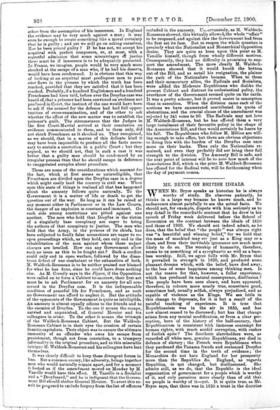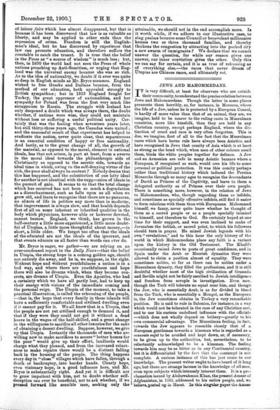MR. BRYCE ON BRITISH IDEALS.
11WHEN Mr. Bryce speaks as historian he is always worthy of study. He observes patiently, he thinks in a large way because he knows much, and he endeavours almost painfully to see the actual facts. We should. not, for example, dispute with him seriously as to any detail in the remarkable contrast that he drew in his speech of Friday week delivered before the School of Economics on the contrast between the ideals of 1850 and those of 1900. We should not indeed admit, as he does, that the belief that "the people" was always right was " a beautiful and winning belief," for we hold that the mass of mankind may err just as a King may or a class, and from their inevitable ignorance are much more likely to do so. The worship of humanity, therefore, seems to us something of a sycophantic as well as a base- less worship. Still, we agree fully with Mr. Bryce that it prevailed in strength in 1850, and produced some pleasant dreams which, with the belief, have died away, to the loss of some happiness among thinking men. Is not the reason for that, however, a fuller experience, which has produced its natural consequence, disillusion ? The people have been seen closer, and have appeared, therefore, in colours more nearly true, sometimes good, sometimes bad, usually selfish, always prejudiced, and as capable of violence as the Kings. We see little in this change to deprecate, for it is but a result of the painful teaching of experience. It is true that Republicanism was in the air in 1850, and has now almost ceased to be discussed; but has that change arisen from any mental modification, or from a clear per- ception, born of the history of the half-century, that Republicanism is consistent with immense contempt for human rights, with much sordid corruption, with rushes of foolish spite ? The Southern slaveholders were, as regarded all white men, genuine Republicans, yet died in defence of slavery ; the French were Republicans when they pardoned the Panama frauds and sentenced Dreyfus for the second time in the teeth of evidence ; the Monarchies do not hate England for her prosperity more than the Republics do. England, as regards Republics, is not changed, but disillusioned. She admits still, as we do, that the Republic is the ideal organisation of government for a people which is worthy of it, and only perceives more clearly than of old that no people is worthy of it—yet. It is quite true, as Mr. Bryce says, that there was in 1850 a trust in the doctrine of laissez faire which has almost disappeared, but that is because it has been discovered that law is as valuable as liberty, and may be applied to other ends than the repression of crime. Freedom is still the English-- man's ideal, but he has discovered by experience that law can promote education, and therefore suffers the constable to catch the truant. It is true that the belief in the Press as "a source of wisdom" is much less; but, then, in 1850 the world had not seen the Press of whole nations preaching up Anti-Semitism, or urging that Eng- land was the universal enemy because she was so rich. As to the idea of nationality, we doubt if it ever was quite so deep in English minds as Mr. Bryce assumes. England wished to free Greeks and Italians because, from the method of our education, both appealed strongly to British sympathies ; but in 1855 England fought for Turkey, the great oppressor of nationalities, and her sympathy for Poland was from the first very much like antagonism to Russia. The struggle with Ireland has only deepened a doubt which was always there, the doubt whether, if nations were wise, they could not maintain without loss or suffering a useful political unity. Cer- tainly that was the feeling when seventeen years later, but still thirty-three years ago, the Canadas were united ; and the successful result of that experiment has helped to eradicate the notion, never quite clear, that separateness is an essential condition of happy or free nationality. And lastly, as to the great change of all, the growth of the material, as opposed to the moral, element in national ideals, has that not arisen, in part at least, from a swerve in the moral ideal towards the philanthropic side of Christianity as opposed to the ascetic side, towards an ideal time in which, owing to the self-denying virtue of the rich, the poor shall always be content ? Nobody denies that this has happened, and the substitution of one lofty ideal for another is not identical with the suppression of ideals in the pursuit of gain. It seems to us that the total change which has occurred has not been so much a degradation as a disenchantment, such as falls upon us all when we grow old, and learn to recognise that there are no panaceas, no elixirs of life in politics any more than in medicine, that improvement is always slow, and that health depends first of all on some inherent or inherited qualities in the body which physicians, however able or however devoted, cannot bestow. England, we think, has grown in the half-century a little more experienced, a little more doubt- ful of Utopias, a little' more thoughtful about money,—in short, a little older. We forget too often that the ideals of the educated are not the ideals of the ignorant, and that events educate us all faster than words can ever do.
Mr. Bryce is eager, we gather—we are relying on an over-condensed report in the Daily News—that the belief in Utopia, the strong hope in a coming golden age, should not entirely die away, and he is, we suppose, in the right. Without hope and without youthfulness a nation is in a bad way, and where there are youthfulness and hope there will also be dreams which, when they become con- crete, are dreams of Utopia. Even the Apostles, who had a certainty which we have all partly lost, had to keep up their energy with visions of the immediate coming and the personal reign. The Utopia of the moment, to take a practical illustration, is called the rehousing of the people, —that is, the hope that every family in these islands will have a sufficiently comfortable and civilised dwelling even if it cannot pay for it. We all know that is a Utopia, that the people are not yet civilised enough to demand it, and that if they were they could not get it without a dead heave in the wages of the half-skilled, and a great change in the willingness to sacrifice all other luxuries for the sake of obtaining a decent dwelling. Suppose, however, we give up that Utopia. Instantly the thousands of men who are willing now to make sacrifices to secure " better homes for the poor" would give up their effort, landlords would charge what they pleased, and from the increased reluct- ance to make repairs there would be a distinct falling back in the housing of the people. The thing happens every day in "close ' villages which have fallen, through a death or bankruptcy, into harder hands. Clearly hope, even visionary hope, is a good influence here, and Mr. Bryce is substantially right. And yet it is difficult not to grow impatient with him, not to doubt whether self- deception can ever be beneficial, not to ask whether, if we pressed forward like sensible men, seeking only the attainable, we should not in the end accomplish more. Is it worth while, if we adhere to our illustrative case, to sing psalms because some Council or benevolent millionaire houses two or three thousand families, and thereby thickens the congestion by attracting into the packed city a new swarm of immigrants ? We declare that we cannot answer the question, for while our reason gives one answer, our inner conviction gives the other. Only this we can say for certain, and it is as true of rehousing as of everything else,—the races that never dream of Utopias are Chinese races, and ultimately rot.







































 Previous page
Previous page